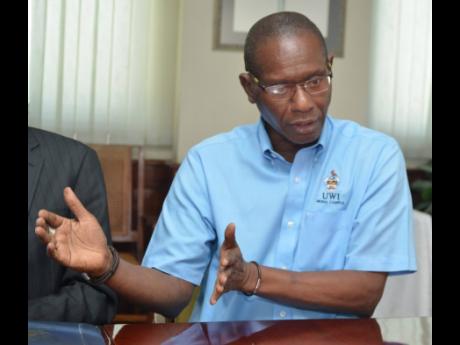‘Political doomsday’
Poll results expose devastating decline in voter interest, but professor convinced politicians unbothered
Jamaica is headed towards “political doomsday”, one political scientist has concluded, after the majority of respondents in the latest Don Anderson poll indicated they did not vote in the 2020 general election.
Fifty-eight per cent of Jamaicans surveyed between November 24 and December 7 said they stayed away from the poll, undertaken at the height of the COVID-19 pandemic, while 37 per cent indicated that their ballot was cast.
Five per cent did not respond or said they could not recall.
The poll has a margin of error of plus or minus three per cent at the 95 per cent confidence level. Some 1,010 Jamaicans 18 years and over and registered to vote participated.
Christopher Charles, professor of political and social psychology at The University of the West Indies, told The Gleaner on Tuesday that the 58 per cent of people who said they did not vote in the last general election indicate that the population is disconnected from politicians and the political process.
According to Charles, they see no value in participating in elections which is evident in the reasons given for those who have never voted.
“Politicians will not take any message from these poll numbers because the voter turnout has been declining in every election since 1980 and they have not taken any message from this political apathy which is clear for all to see,” said Charles.
“Politicians do not mean Jamaica any good. They are constant underperformers because they are incompetent. If the politicians were running their homes and businesses like how they have been running Jamaica, they would be homeless paupers,” Charles added.
Twenty-three per cent of those polled said they have never voted in a general election, while 77 per cent said they have.
Among the reasons given from participants who have never voted were a lack of community development and too many unfulfilled promises.
Combined, the two responses reflected the feelings of 57 per cent of those who have never voted.
LOW VOTER TURNOUT
“Some 37 per cent argue that they were not seeing development in the community; there were unfulfilled promises (11 per cent) and eight per cent said they were not interested. These figures comprise 65 per cent of the respondents, indicating that the majority are turned off from politics. This is the reason why the voter turnout was very low at 38 per cent in the 2020 general election,” Charles noted.
“I am not hopeful for Jamaica in terms of economic growth and development when it comes to the political class. Members of the political class put common sense over science, political loyalty over competence, their friends and party loyalists over professional experts, what they think over what works, their impressions over empirical research, and their political party over Jamaica. We are heading towards political doomsday,” the professor asserted.
Veteran pollster Don Anderson, whose Market Research Services Limited conducted the internal poll that was sponsored by a company on the Jamaica Stock Exchange, disclosed that more men than women voted in the September 2020 general election.
“Forty-three per cent of males said they voted in the last election as against historical patterns where the females were the more strongly represented group. Thirty-three per cent of females participated in the last election,” Anderson said of the 37 per cent of respondents who voted.
In terms of voting history, he said the lowest incidents of voting have been among the 18-24 age group, where only 32 per cent of participants indicated that they have ever voted.
On the other hand, seniors aged 55 years and over had the highest incidents of voting.
Punching above average, 94 per cent of participants aged between 55 and 64 years said they have a voting history while 96 per cent of those 65 years and over have cast a ballot.


